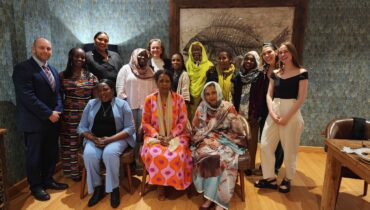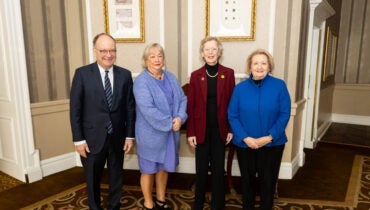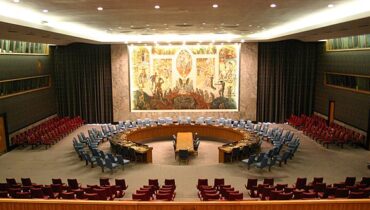Understanding the gendered impacts and implications of conflict and security issues is critical to producing more successful policies and outcomes.
Women and girls are often disproportionately and uniquely impacted by conflict, poverty, climate change, and other pressing issues. And, they are important agents of change in preventing conflict, growing economies, and addressing relevant threats such as violent extremism. Indeed, research overwhelmingly shows that investing in women and girls and including more women in peace negotiations and leadership positions are key to creating sustainable solutions.
We need informed leaders willing to prioritize women and girls in foreign policy. And this begins right here at Georgetown, where future policymakers and leaders in international affairs are being educated—in the classroom.
Are you interested in women, peace, and security? Georgetown is offering several compelling courses for Fall 2018 for undergraduate students interested in studying international affairs through a gender lens.
Classes For Undergraduates in the School of Foreign Service
“Women and Gender in Islam” will be offered in the Arabic Department and taught in English. Drawing on a variety of historical, legal, literary, and other sources, this class will seek to challenge static assumptions about Muslim women. Using feminist theories and theories of gender and sexuality, students will explore the “complex, diverse, and changing interaction between women and Islam through space and time.” This course fulfills credit for the Regional & Comparative Studies focus in the Middle East.
The Latin American Studies Program is offering a course on “Gender and the Environment in Latin America.” Utilizing gender analysis as a tool, students in this class will review current trends in sustainable development and the impact of farming and natural resource development in select sub-regions of Latin America. Additionally, students will have the opportunity to study these phenomena through real case studies documenting gender gaps in access to a range of agricultural resources. The class will be taught by Patricia Biermayr-Jenzano, a visiting scholar with the Center for Latin American Studies and an expert on mainstreaming gender in agriculture and conservation-related efforts. This course fulfills credit for the Regional & Comparative Studies focus in Latin America.
In the Women’s and Gender Studies Program, two interesting courses will be offered related to women, peace, and security. WGST-251 “Gender and the Law” will explore how concepts of masculinity and femininity shape the U.S. legal system. It will be taught by Sara Collina, an adjunct lecturer in the Women’s and Gender Studies Program whose research focuses on how domestic public policy shapes—and is shaped by—gender, particularly in women’s health and sexual misconduct in education settings. This course fulfills credit for the Culture & Politics Social Science requirement, as well as the Regional & Comparative Studies Theory and Methods requirement.
Another course, WGST-260 “Violence/Gender/Human Rights” will explore the gendered manifestations of violence within the context of globalization, development, and human rights. Additionally, students will also pay special attention to different forms of violence: “banal violence (that is, daily and “banal” violence in everyday life), spectacular violence at moments of crisis, and the type of violence that disrupts the boundary between the two.” Violence/Gender/Human Rights is taught each year by Professor You-Me Park, Director of the Women’s and Gender Studies Program.
In the Linguistics Department, Professor Jennifer Marie Sclafani will teach “Women, Men, and Language.” Students in the course will explore the “complex relationships between language, gender, and sexuality, integrating theory and analytical perspectives from sociolinguistics and gender theory.” Additionally, students will have the opportunity to conduct original research on a topic of their choice in this field. Professor Sclafani is an Associate Teaching Professor in the Linguistics Department, where she has taught courses in sociolinguistics, language, and gender since 2011. This course fulfills credit for the Culture & Politics Social Science requirement, as well as the Regional & Comparative Studies Theory and Methods requirement.
Classes For Undergraduates in Other Schools
Not in the SFS? Several other courses, including an Environmental Studies course on “Population, Gender & Environment,” a Global Health course on “Gender, Health & Development,” and a Government course on “Gender & Conflict Resolution” are also available for Fall 2018.


